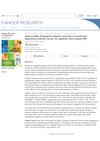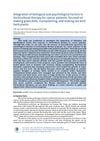 2 citations,
October 2021 in “Exploration of targeted anti-tumor therapy”
2 citations,
October 2021 in “Exploration of targeted anti-tumor therapy” Breast cancer hormone therapy can cause hair loss, which can be treated with daily applications of specific topical solutions like minoxidil and hydrocortisone butyrate.
 2 citations,
March 2020 in “Cell”
2 citations,
March 2020 in “Cell” Elaine Fuchs' research shows how skin stem cells maintain health, aid in healing, and are involved in cancer.
 2 citations,
October 2018 in “Springer eBooks”
2 citations,
October 2018 in “Springer eBooks” Cancer treatments can cause skin-related side effects that may affect patient quality of life and require changes in treatment.
 2 citations,
December 2013 in “Cancer Research”
2 citations,
December 2013 in “Cancer Research” Some early breast cancer patients have long-term hair loss after chemotherapy, especially older and postmenopausal women.
2 citations,
December 2013 in “Cancer research” Enobosarm may effectively treat androgen receptor-positive breast cancer with fewer side effects.
1 citations,
November 2021 Non-invasive methods can effectively monitor skin inflammation and cancer biomarkers.
 1 citations,
November 2017
1 citations,
November 2017 The document concludes that while some organisms can regenerate body parts, mammals generally cannot, and cancer progression is complex, involving mutations rather than a strict stem cell hierarchy.
 1 citations,
January 2016 in “Elsevier eBooks”
1 citations,
January 2016 in “Elsevier eBooks” The document concludes that identifying the specific cells where skin cancers begin is important for creating better prevention, detection, and treatment methods.
 June 2024 in “Journal of Clinical Oncology”
June 2024 in “Journal of Clinical Oncology” Frequent use of chemical hair relaxers may increase endometrial cancer risk in Black women.
 June 2024 in “British Journal of Dermatology”
June 2024 in “British Journal of Dermatology” Permanent hair loss from chemotherapy significantly impacts patients' mental health and social life, highlighting the need for better patient education and support.
 April 2024 in “Academic dermatology”
April 2024 in “Academic dermatology” Dermatologists should carefully manage hair loss in cancer patients to improve their quality of life.
 March 2024 in “Cancer Research”
March 2024 in “Cancer Research” Men with baldness on the top of their head might have a small increased risk of prostate cancer.
 March 2024 in “Frontiers in genetics”
March 2024 in “Frontiers in genetics” Different types of fibroblasts play specific roles in wound healing and cancer, which could help improve treatments.
 July 2023 in “Archives of Dermatological Research”
July 2023 in “Archives of Dermatological Research” Minoxidil may help with hair loss caused by cancer treatments.
 June 2023 in “Journal of multidisciplinary sciences”
June 2023 in “Journal of multidisciplinary sciences” PCOS may increase the risk of certain cancers.
 June 2023 in “Journal of multidisciplinary sciences (Online)”
June 2023 in “Journal of multidisciplinary sciences (Online)” PCOS is linked to a higher risk of endometrial cancer but not ovarian or breast cancer, and more research is needed on its role in cancer development and treatment effects.
 June 2023 in “British Journal of Dermatology”
June 2023 in “British Journal of Dermatology” High-quality data on skin cancer is crucial for understanding its trends and allocating healthcare resources effectively.
 April 2023 in “Journal of Investigative Dermatology”
April 2023 in “Journal of Investigative Dermatology” The research shows that skin cancer likely originates from hair follicles and that certain cell populations expand to promote skin cancer growth.
 April 2023 in “Cancer research”
April 2023 in “Cancer research” KRTAP2-3 could help predict cancer recurrence by identifying specific cancer cells.

DOPE:DOPC liposomes can improve targeted cancer drug delivery, reducing side effects and increasing effectiveness.
 July 2022 in “Research Square (Research Square)”
July 2022 in “Research Square (Research Square)” Huaier helps hair grow back and repairs tissue after cancer treatment.
June 2021 in “BIOMED natural and applied science” Chemotherapy targets all dividing cells, causing side effects like nausea and hair loss.
 July 2019 in “Acta horticulturae”
July 2019 in “Acta horticulturae” Horticultural therapy helped cancer patients feel hopeful and positive about their disease experience.
June 2019 in “Advanced medical journal” Cancer drugs often cause temporary hair, skin, nail, and mouth issues.
 August 2017 in “Journal of epidemiological research”
August 2017 in “Journal of epidemiological research” Cancer rates are increasing in developed countries, with estrogen, aging, low vitamin D3, and HPV infection as common causes.
 February 2017 in “Cancer Causes & Control”
February 2017 in “Cancer Causes & Control” Swedish men with the E213 A-allele of the androgen receptor have a lower risk of prostate cancer.
July 2016 in “Cancer research” Mutant cells in hair follicles are influenced by their location and interactions with surrounding cells.
 July 2016 in “Cancer Research”
July 2016 in “Cancer Research” Male pattern baldness is linked to a higher risk of certain skin cancers, especially on the scalp.
April 2016 in “The journal of investigative dermatology/Journal of investigative dermatology” Activating Sonic Hedgehog signaling in cancer stroma may help treat basal cell carcinoma.
May 2015 in “Cancer research” After chemotherapy for early breast cancer, 33.4% of patients had long-term significant hair loss, with some hair regrowth over time, but treatments for hair loss were largely ineffective.






















